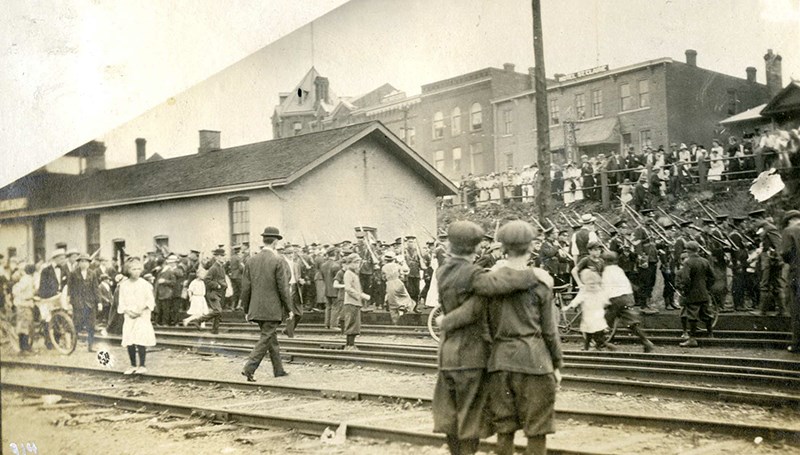Randy Evans
Special to The Journal
Personal letters are usually private and confidential, but during the extraordinary circumstance of the First World War some of them were shared with the public.
Below are excerpts of letters or telegrams written by local soldiers and published in the Sarnia Daily Observer or Sarnia Canadian Observer from 1914 to 1918.
Little of the correspondence described the mud, rats and death of the trenches. It was as if there was an unspoken understanding that war caused homesickness, sacrifice and an acute awareness of one’s mortality.
………………………..
Whitley Camp, Surrey, England, Oct. 28, 1917
Dear Ona:
I received your card this morning and sure was glad to hear from you… [Our Captain] gave us a smoking concert the other night … We had a good time. We had a rabbit dinner today and it sure tasted good …
I remain as ever your friend
- Eddie
(Pte. Eddie Causley was killed in action on Aug. 30, 1918 less than one year after writing. He was 20.
………………….
Shorncliffe, England, July 5th, 1916
Dear Mrs. Elsworth:
Two dozen pair of socks arrived today. I distributed them amongst the Sarnia men who are with us. They were certainly glad to receive them and being from home they were doubly welcome ...They asked me to thank the members of the Pro Patria Chapter I.O.D.E… I expect to leave for France any day now …
Yours sincerely
Stewart Cowan
(Lieut. Cowan would be killed by shellfire on the Somme three months later. He was 26.)
…………………….
“Life in the trenches is not a pleasant one … The fields that surround us are literally covered with the bodies of dead soldiers. We hope for the end but we cannot tell how long the war will last.”
Pte. Garnet Dawson to his parents.
(Pte. Dawson survived the war)
……………………………
Somewhere at the Front, July 5, 1917
My Dear Mother:
It rains or sleet every day nearly. Raw and miserable and the trenches are a terror. Actually water over the knees have I stood in for 2 days and nights and kept my back humped up and my head down below the trenches at all times.
Pte. William Harry Jennings to his mother.
(Pte. Jennings survived the war.)
………………………..
March 21, 1918
Miss Blanch Haslip received the following letter from Pte. Frank Janes
Dear Friend – Just a line to let you know Art and Jim were transferred to the I.M.F. yesterday … I am trying hard to get in the same draft as they are as I wish to keep with them.
Pte. Frank Janes was wounded but survived the war.
………………………….
I was lucky enough to see the explosion of the mines … It was a grand spectacle if one could forget that part of the setting was human [German] lives. Talk about rivers being red with blood, here it was shell holes filled with water that was red with blood….”
Sgt. William Chapman, in August 1917, to his friend Thomas Peacock.
(Sgt. Chapman was killed on Sept. 27, 1917. Age 40).
……………………………..
Jas. Janes 137 North Brock St. has received the following telegram: Ottawa July 19, 1916.
Sincerely regret to inform you that 2654 Lance-Corp. Frank Janes …wounded severely in hand.
(Lance-Corp. Janes survived the war).
…………………………
Mrs. E. Bending, 265 Exmouth St., has received a telegram from Ottawa stating that her husband Pte. Arthur Bending has been wounded ... gunshot wound to the back.
(Pte. Bending survived the war).
……………………….
Mr. and Mrs. James Ross, 277 Emma St., have received the following official message. Ottawa Ont. Oct.16 sincerely regret to inform you that 53613 Pte. Peter Ross officially declared dangerously wounded.
(Pte. Peter Ross survived the war.)
……………………………
The following letter has been received by Mrs. Mary Eddy, 330 South Vidal St., Sarnia
Dear Mrs. Eddy:
It is with deep regret that I have to inform you of the death in action of your son Gunner W.P. Eddy … During a period of enemy shelling a shell burst close by the gun killing your son instantly … our deepest sympathy in your great grief.
……………………….
Mrs. Annie Stott 249 Queen St. received a telegram this morning from Ottawa stating that her husband Private Herbert Stott has died of wounds … He is survived by his widow and five children the youngest child being three years of age.
Pte. Herbert Stott was 36
…………………….
Mrs. Fred Sproule received this message today. “Deeply regret to inform you … Pte. William Henry Reynolds infantry officially reported died of … gunshot wounds in chest.
Pte. William Henry Reynolds was 29
…………………………………..
Thedford, Ont. Oct 16. Mrs. Pickell of Bosanquet has received official notice of the death of her son Pte. Baden Powell Pickell who was killed in action.
Pte. Baden Powell Pickell enlisted at age 16 and died at age 18.
As the Allies began a final offensive in late summer of 1918 the number of telegrams advanced by the families to the newspaper increased in numbers and intensity, and were sometimes grouped together on the front page.
On Dec. 26, 1918, The Observer ran a four-page feature with the photographs of 136 local soldiers. Some had fallen, some had not.
Among them Flight Lieut. Neil Hanna, who was killed on duty in Italy in an airplane crash nine days after the Nov. 11 Armistice. The 21-year-old was Sarnia’s last overseas casualty of The Great War.
